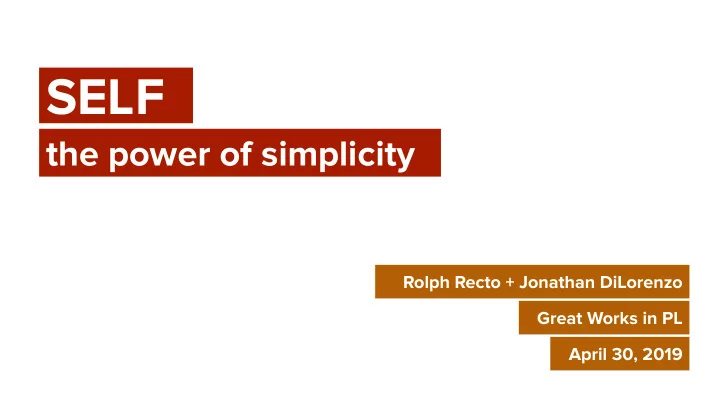

SELF the power of simplicity Rolph Recto + Jonathan DiLorenzo Great Works in PL April 30, 2019
SELF: The Power of Simplicity David Ungar, Stanford Randall B. Smith, Xerox PARC OOPSLA 87 2
1967 Simula67 Dahl and Nygaard 1980 Smalltalk-80 Kay, Ingalls, and Goldberg 1985 C++ Stroustrup 1987 Self Ungar and Smith 1991 Java Gosling, Sheridan, and Naughton Javascript Eich 1995 3
Is JavaScript popular? It’s hard to say. Some Ajax developers profess (and demonstrate) love for it. Yet many curse it, including me. I still think of it as a quickie love-child of C and Self. Brendan Eich https://brendaneich.com/2008/04/popularity/ 4
principles of Self all interactions everything is an prototypes, not are message object classes passing 5
everything is primitive values an object methods and closures control structures classes Smalltalk 6
((4 fac) between: 10 And: 100) ifTrue: “Hi!” False: ”Bye!” call “ fac ” method on 4 , return 24 call “ between:And: ” on 24 with args 10 and 100 , return true call “ ifTrue:False: ” on true with args “Hi!” and “Bye!” , return “Hi!” 7
objects are instances objects are clones of classes of prototypes Smalltalk Self 8
objects are instances objects are clones of classes of prototypes C++ Java Javascript Smalltalk Self 9
classes prototypes create objects by calling create objects by cloning class constructor prototype can modify methods only by objects can have unique subclassing methods and fields classes need metaclasses, no classes, etc. (infinite regress!) no infinite regress 10
p := (Point new) x: 7 y: 9 classes p print follow p’s class pointer, check if print is defined there not defined there, so follow superclass pointer found “print” in Object class! Invoke with receiver “p” 11
p := (Point new) x: 1 y: 10 classes p print follow p’s class pointer, check if print is defined there not defined there, so follow superclass pointer found “print” in Object class! Invoke with receiver “p” to have different print method, need to create Point subclass 12
p:= (point clone) x: 7 y: 9 prototypes p print does p have print method? no, so follow parent pointer to delegate does Point delegate have “print”? no, so follow parent pointer to delegate does Object delegate have print? yes, invoke with “p” as receiver 13
p:= (point clone) x: 1 y: 10 prototypes p print does p have print method? no, so follow parent pointer to delegate does Point delegate have “print”? no, so follow parent pointer to delegate does Object delegate have print? yes, invoke with “p” as receiver to have special print method for p, define new slot in p -- no subclass needed! 14
activation as cloning method invocation clones prototype activation record 15
state as behavior field access and assignment are messages to current receiver (self) 16
state as behavior p x // p.x p x: 2 // p.x = 2 17
_AddSlotsIfAbsent: (| example: points traits = (). prototypes = (). |) root traits prototypes 18
traits _AddSlotsIfAbsent:(|cloneable=()|) example: points traits cloneable _Define:(| copy = (_Clone). |) root traits prototypes copy _Clone cloneable 19
traits _AddSlotsIfAbsent: (|point=()|) example: points traits point _Define:(| parent* = traits cloneable. printString = … root + aPoint = … - aPoint = … traits |) prototypes copy _Clone cloneable point parent* printString [method] + [method] - [method] 20
prototypes _AddSlotsIfAbsent (|point=()|) example: points prototypes point _Define:(| parent* = traits point. x <- 0. root y <- 0. |) traits prototypes copy _Clone cloneable point point parent* printString [method] parent* + [method] x 0 - [method] x: ⇐ y 0 y: ⇐ 21
((prototypes point) copy) x: 3 y: 4 example: points root traits prototypes copy _Clone cloneable point point parent* printString [method] parent* parent* + [method] x x 0 3 - [method] x: x: ⇐ ⇐ y y 0 4 y: y: ⇐ ⇐ 22
discussion are there cases when is Self a good influence on what are the tradeoffs of simplicity should be modern languages? Self’s flexibility? abandoned? 23
Recommend
More recommend